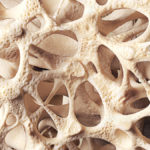By David Blyweiss, M.D.
What effect do you think caustic chemicals have on your bones? If you think they sound dangerous, you’re absolutely right.
Unfortunately, millions of men and women are using unsafe drugs that contain bisphosphonates to strengthen their bones and reduce the risk of fracture. However, drugs designed to strengthen bones, like Fosamax and Boniva, may actually be doing more harm than good.
These drugs actually kill osteoclasts, the cells that remove old bone so that new bone-building cells called osteoblasts can form. While this seems to work for a while, long-term use leads to brittle old bone that is thicker, but more prone to fracture. And this isn’t limited to your hips or spine. When you take a bisphosphonate drug it increases the risk of fracture throughout your entire body.
But that’s just the tip of the iceberg. These drugs have also been linked to a new form of jaw bone death called osteonecrosis. In one three-year study at USC, the jaws of dozens of patients who had undergone oral surgery failed to heal properly. Part of the jawbone had died and become exposed. The common link? All of the patients had been treated with bisphosphonates.
If the solution is worse than the disease, what do you do? In my practice, when patients come to me with osteoporosis and bone fractures, I recommend calcium and vitamin D supplementation.
I recommend taking at least 1,000 IU of Vitamin D with 1,200 to 1,500 mg. of calcium daily (in divided doses). Without adequate vitamin D, you can take all the calcium in the world and it won’t do you any good.
The World's Quickest Solution for Ending Prostate and Urinary Misery
This has recently been revealed to be one of the only real breakthroughs in prostate health.
The seeds of a strange fruit (sometimes called "Chinese Apples") hold powerful phytonutrients that are a revolution in prostate health.
In fact, UCLA and Veterans Administration research have now proved this to be true.
Not only that, but it may be the worlds quickest solution for ending prostate misery.
Simply stated, these phytonutrients represent a huge step beyond beta sitosterol, saw palmetto, and other phytosterols alone.
Simply click HERE if you want to have fast prostate relief...restful, uninterrupted sleep...no more constant "urges to go"...enhanced virility...and optimal prostate support for life.
Additionally, you should do the following to strengthen your bones safely and naturally:
- Avoid bone robbers. Limit your alcohol intake, stop smoking, limit the amount of salt and sugar you eat, and don’t drink soda. Sodas are loaded with phosphoric acid, a known robber of calcium. In fact, for every can of soda you drink, your bones lose between 5 and 8 mg. of calcium.
- Add vitamin K. This nutrient ensures that your bones hold on to calcium.
- Remember to take trace minerals like silica, copper, boron and manganese. A comprehensive bone-building supplement will contain all of these critical nutrients.
- Exercise. Studies show that weight-bearing exercise is just as important to your bone health as taking calcium.
References:
Badel T. Relationship between osteonecrosis of the jaw and bisphosphonate treatment. Arh Hig Rada Toksikol. 2010;61:371-380.
Green J. Oral bisphosphonates and risk of cancer of oesophagus, stomach, and colorectum: case-control analysis within a UK primary care cohort. British Medical Journal. 2010;341:c4444.
Laktasic-Zerjavic N. Vitamin D status, dependence on age, and seasonal variations in the concentration of vitamin D in Croatian postmenopausal women initially screened for osteoporosis. Clinical Rheumatology. 2010;29:861-867






